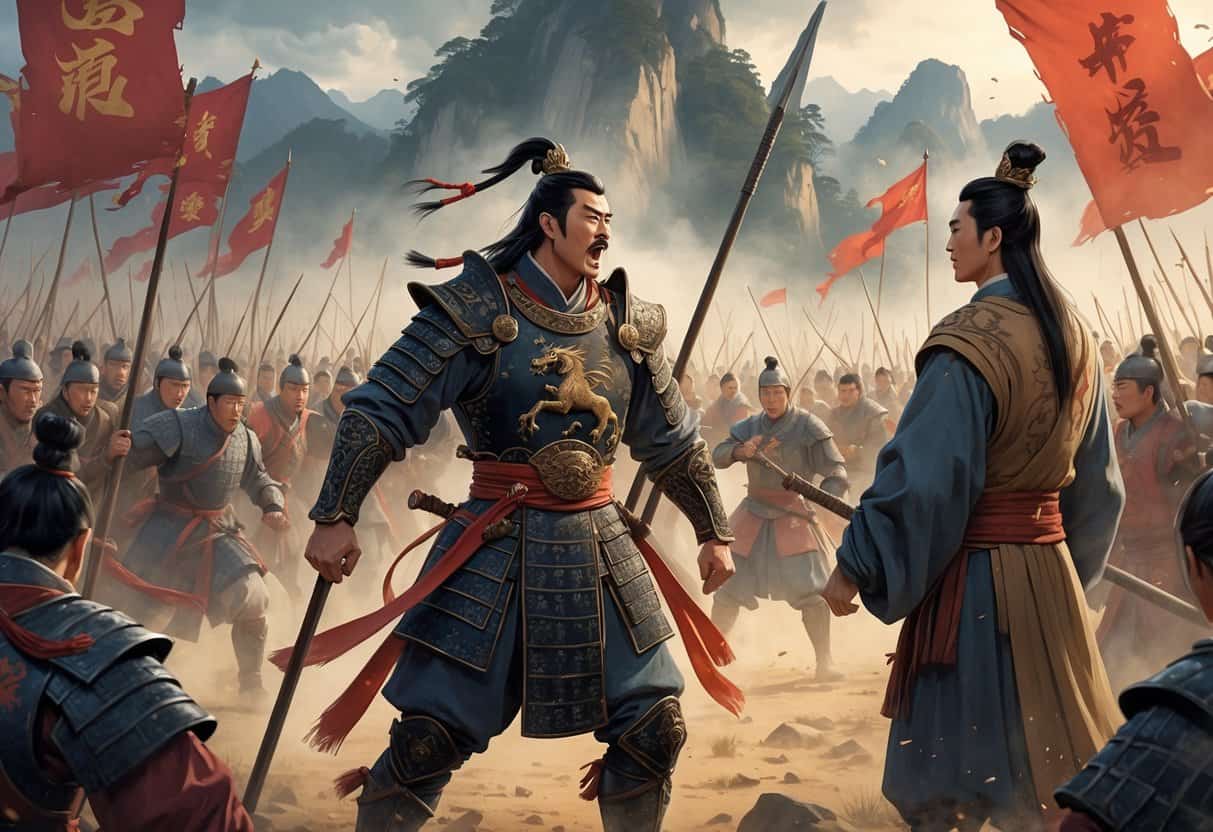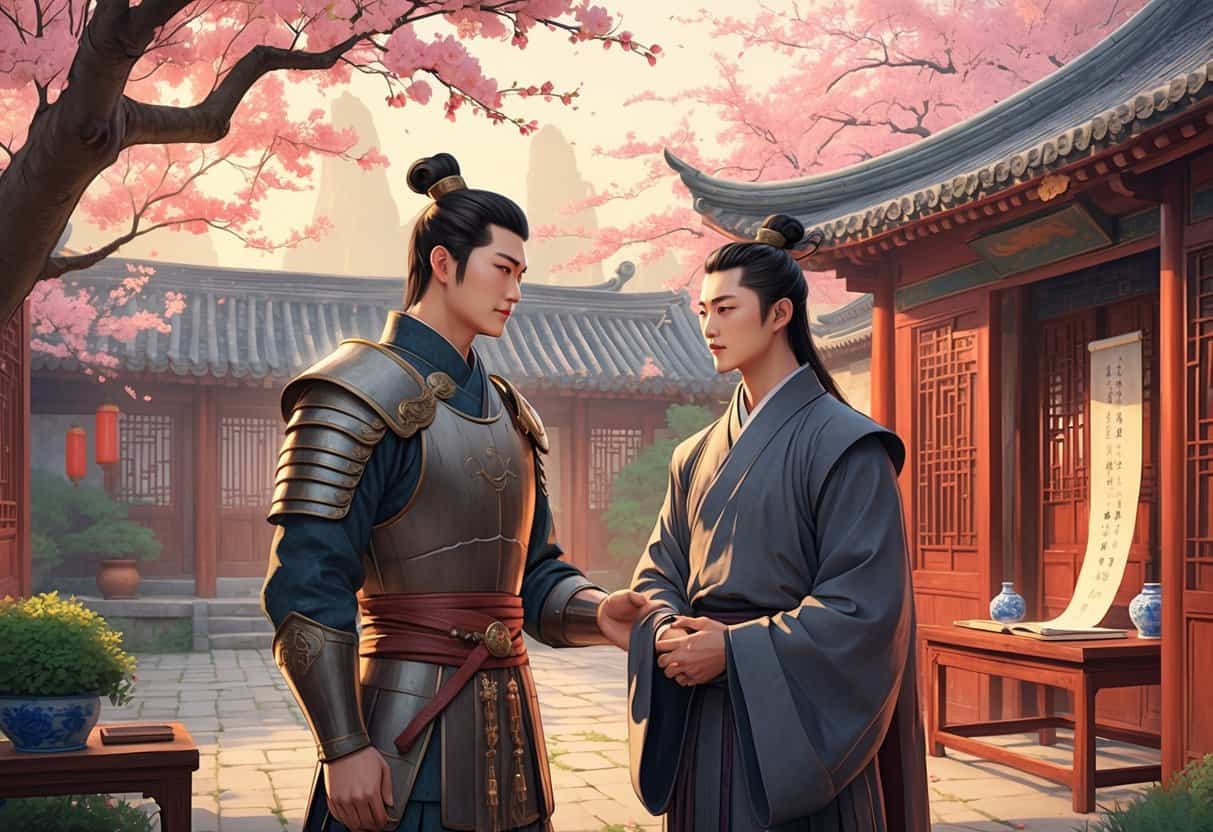Zhang Fei played a crucial role in Liu Bei’s rise during the wild Three Kingdoms period in China. As one of Liu Bei’s closest allies and generals, Zhang Fei’s bravery and strength helped secure key victories that shaped the founding of the Shu Han dynasty.
His fierce loyalty and military skill made him an important figure in supporting Liu Bei’s claim to power.

Zhang Fei’s early friendship with Liu Bei helped build a bond that lasted through countless battles. His presence on the battlefield and influence within Shu contributed directly to Liu Bei’s success in challenging rival warlords.
Zhang Fei’s story isn’t just about war. It’s about loyalty, leadership, and the messiness of ambition during one of China’s most dramatic eras.
Understanding Zhang Fei’s role gives a window into how the Three Kingdoms period is remembered in literature and pop culture—especially in the classic “Romance of the Three Kingdoms.” His legacy still pops up today in stories and games, shaping how people see this slice of history.
Key Takeways
- Zhang Fei was a key military supporter of Liu Bei’s rise to power.
- His loyalty and strength helped secure Shu’s place during the Three Kingdoms.
- Zhang Fei remains a lasting figure in Chinese culture and historical storytelling.
Zhang Fei’s Early Life and Relationship With Liu Bei

Zhang Fei’s family background was humble, and his early life isn’t well documented. He lived in a small town, where he gained a reputation for being strong and a bit rough around the edges.
Some say he was a fierce and sometimes unruly man before joining Liu Bei. His bold personality stood out, even if he sometimes stirred up trouble in his hometown.
This background shaped his approach to loyalty and battle later on. He wasn’t born into nobility, unlike many generals of the era.
Zhang Fei met Liu Bei and Guan Yu during a turbulent time in the Han Dynasty. The three swore an oath in a famous ceremony, promising to support each other like brothers.
The oath took place in the Peach Garden. This brotherhood wasn’t just symbolic—it united three men from different backgrounds for a common goal.
Their friendship became a key factor in Liu Bei’s rise to power. It’s kind of wild to think how that single act of loyalty echoed through so many battles.
During the Yellow Turban Rebellion, Zhang Fei fought alongside Liu Bei and Guan Yu to defend the Han Dynasty. This rebellion was a massive peasant uprising that threatened the empire’s stability.
Zhang Fei showed courage and a certain brutality in battle, helping protect their community. His actions here helped establish the group as serious leaders at a time when chaos was everywhere.
Key Contributions to Liu Bei’s Rise
Zhang Fei played several important roles in helping Liu Bei gain power. His skills in combat, defense, and strategy were essential.
He also showed unwavering loyalty, which helped Liu Bei build trust and influence. That’s not something you can just fake.
Military Prowess and Battlefield Achievements
Zhang Fei was a fierce warrior, famous for his strength and guts on the battlefield. You’d often find him leading charges, breaking enemy lines with bold attacks.
His combat skills helped secure victories in key battles that kept Liu Bei’s forces moving forward. Troops trusted his courage and followed him into danger.
Zhang Fei’s actions showed not just brute force but real military strategy, influenced by ideas like those in Sun Tzu’s Art of War. He wasn’t just muscle—he had a mind for tactics.
Defense and Guarding Strategic Locations
When it came to defense, Zhang Fei was tasked with guarding important positions. His job was to protect Liu Bei’s strongholds and keep supply lines safe.
Losing those spots could have spelled disaster. Zhang Fei’s presence made it tough for enemies to get through.
He stood firm, sometimes against overwhelming odds, until reinforcements arrived or the tide turned. His sense of honor and loyalty kept him rooted where others might have fled.
Ambushes and Tactical Maneuvers
Zhang Fei wasn’t just about head-on fights. He set ambushes, using the terrain and timing to catch enemies off guard.
You can picture him waiting along narrow paths, ready to spring a trap. These moves disrupted enemy plans and gave Liu Bei’s side time to regroup or advance.
His clever use of The Art of War principles made him a threat even to larger or better-equipped armies. He didn’t just fight hard—he fought smart.
Support of Liu Bei’s Leadership and Vision
Beyond fighting, Zhang Fei was a pillar of support for Liu Bei’s leadership. He helped build loyalty among the troops by showing his own fierce allegiance.
His honor and sense of duty reflected Liu Bei’s goal of restoring the Han Dynasty’s mandate of heaven. Zhang Fei’s close bonds with leaders and soldiers alike strengthened Liu Bei’s influence.
His presence beside Liu Bei symbolized trust and unity. That kind of support was key in making Liu Bei look like a legitimate leader in such a chaotic time.
Zhang Fei’s Impact Within Shu and the Three Kingdoms Era
Zhang Fei played a big role in the rise of Shu and was deeply involved in both military and political events of the Three Kingdoms period. His relationships with Liu Bei and other generals shaped many battles and strategies.
He was right in the thick of things—building alliances, defending borders, and sometimes butting heads with rivals.
Relations With Key Figures in Shu and Beyond
Zhang Fei’s loyalty to Liu Bei was legendary. He was sworn brothers with Liu Bei and Guan Yu, forming a bond that brought loyalty and unity to Shu.
He worked closely with Zhuge Liang on strategies and supported generals like Zhao Yun and Ma Chao during campaigns. His relationship with Guan Yu was especially important, as both were known for their bravery and devotion.
This bond boosted morale within Shu. Beyond his own kingdom, Zhang Fei had run-ins and rivalries with figures from Wei and Wu, like Cao Cao and Sun Quan, though direct meetings were rare.
His fierce personality sometimes caused friction, but it also inspired respect. As Liu Bei’s ally, he was central in defending Shu’s interests.
Notable Battles and Conflicts
Zhang Fei was active in several major battles. He fought in the Battle of Red Cliffs (Battle of Chibi), a turning point where Shu allied with Wu to stop Cao Cao’s forces.
He also led troops in Liu Bei’s invasion of Yizhou and played a part in the Hanzhong Campaign. Zhang Fei’s bravery was famous, and his loud battle cries could rally soldiers when things looked grim.
His combat achievements were sometimes overshadowed by Guan Yu or Zhao Yun, but his ability to hold key positions and face off against tough enemies like Pang De and Lu Bu was vital for Shu’s survival.
Role in Political and Strategic Developments
Zhang Fei wasn’t a political mastermind like Zhuge Liang, but his loyalty and military support were crucial to Shu’s strategy. He secured territory and won battles that strengthened Liu Bei’s rule.
His reputation for toughness helped keep order within Shu. Zhang Fei’s presence reassured troops and added muscle to Liu Bei’s leadership.
He complemented Zhuge Liang’s brains with his own brawn. Together, they made Shu’s strategy a mix of clever planning and raw power.
Rivalries and Interactions With Other Kingdoms
Zhang Fei had clear rivalries with generals from Wei and Wu. His harsh demeanor and skill made him a feared opponent, especially against Wei leaders like Cao Cao and Sima Yi.
In Wu, generals such as Sun Quan and Zhou Yu were both rivals and, at times, uneasy allies. Zhang Fei’s role in the Red Cliffs alliance showed he could work with Wu when it mattered.
He also clashed with figures like Dong Zhuo and Yuan Shao in earlier years. Zhang Fei’s toughness allowed Shu to defend against both internal threats and outside attacks.
| Kingdom | Key Rivals Faced | Role |
|---|---|---|
| Wei | Cao Cao, Sima Yi, Pang De | Defense, battlefield resistance |
| Wu | Sun Quan, Zhou Yu | Temporary alliance, rivalry fight |
| Shu | Liu Bei, Guan Yu, Zhao Yun | Brotherhood, military campaigns |
Legacy of Zhang Fei in Literature, Culture, and Games
Zhang Fei’s image as a strong and loyal warrior has shaped how he appears in books, culture, and video games. His bravery and rough personality are front and center in stories and art.
In games, Zhang Fei’s fighting style gives players a unique experience. You can almost feel the energy and unpredictability he brought to the battlefield.
Depiction in Romance of the Three Kingdoms
In Romance of the Three Kingdoms, written by Luo Guanzhong during the Ming Dynasty, Zhang Fei is one of the “Five Tiger Generals.” He’s portrayed as bold and fierce, often charging into battle with wild strength.
The novel blends history with legend, showing his temper and his deep brotherly bond with Liu Bei and Guan Yu. He fits Confucian values like loyalty and honor, even if he sometimes acts out of anger or uses trickery.
Influence on Chinese Culture and Values
Zhang Fei stands for loyalty, honor, and brotherhood in Chinese culture. His story is a classic example of standing by friends through thick and thin—a core Confucian ideal.
People admire his courage, even if his style was a bit rough. In art and literature, he’s become a folk hero and a symbol of how strength and honor can go hand in hand.
Confucian values like benevolence and loyalty are often tied to Zhang Fei’s actions. He’s a reminder that sometimes, the roughest people have the strongest sense of right and wrong.
Zhang Fei in Modern Media and Games
You’ll spot Zhang Fei all over the place in video games—Dynasty Warriors (Musou mode) is probably the one that comes to mind first. He’s also a staple in the Romance of the Three Kingdoms strategy series, which some folks know as Sangokushi in Japan.
When you play as him, it’s usually all about those hard-hitting normal attacks. Sometimes he gets counters, and his Musou attacks? They’re just wild, really capturing that fierce, almost reckless energy.
Game AI tends to cast him as a tough frontline brawler, which lines up with how he’s remembered in history. His look and moves borrow a lot from old Chinese stories and art, so he always feels kind of rooted and real.
Every now and then, you’ll even see games like God of War toss in a character that’s clearly inspired by Zhang Fei. It’s funny how his legend sneaks into games far outside of East Asia.